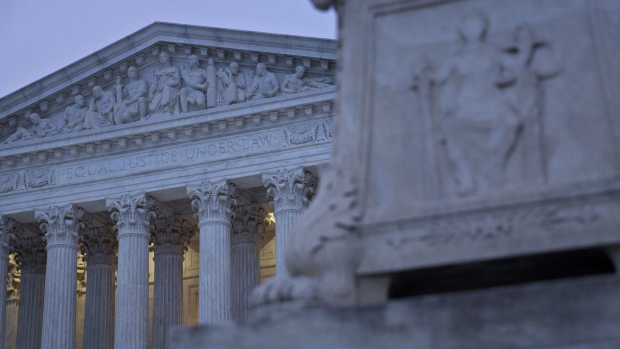Apr 15, 2019
Supreme Court Justices Signal Divide on Vulgar-Trademark Rights
, Bloomberg News

(Bloomberg) -- U.S. Supreme Court justices seemed divided as they considered a law that bars the federal government from granting legal protections to trademarks that officials find to be lewd or vulgar.
Hearing arguments Monday in a case centering on a clothing line known as "FUCT," the justices considered striking down a century-old provision that bars the inclusion of “scandalous” and “immoral” trademarks on a federal government registry. The case is a follow-up to a unanimous 2017 ruling that threw out a similar ban on disparaging trademarks.
Critics of the vulgarity ban say it can’t be applied consistently. The U.S. Patent and Trademark Office rejected the "FUCT" application, but separately allowed registration of “fcuk,” “wtf is up with my love life?!” and “fword.”
"How is a reasonable citizen supposed to know?" Justice Neil Gorsuch asked in Monday’s hour-long session. "What notice do they have about how the government’s going to treat their mark?"
Some justices tried to find a way to let federal officials reject a limited number of highly offensive words. Justice Stephen Breyer said "FUCT," or at least its phonetic equivalent, was one of a handful of terms known to trigger an especially strong physiological response and become lodged in a person’s memory.
"Most people know what words we’re talking about," he said.
Justice Ruth Bader Ginsburg questioned whether the word was necessarily offensive. She said the word might be "mainstream" in the "niche market" being targeted by Erik Brunetti, the creator of the clothing line. Brunetti describes his clothes as “street fashion.”
But Chief Justice John Roberts raised the example of a person walking through a shopping mall wearing a "FUCT" shirt with children present. The shirt’s owner is "not the only audience" Brunetti reaches, Roberts said.
Federal registration gives trademark owners protections on top of those they already have under state law. Registration can confer exclusive rights in parts of the country where no one was already using the name or image, help owners win lawsuits, and put would-be competitors on notice that a trademark is legally protected.
The Trump administration is defending the ban, saying that Brunetti is free to use the FUCT label but doesn’t have the right to claim the legal benefits of federal registration.
The court will decide the case by June. The case is Iancu v. Brunetti, 18-302.
To contact the reporter on this story: Greg Stohr in Washington at gstohr@bloomberg.net
To contact the editors responsible for this story: Joe Sobczyk at jsobczyk@bloomberg.net, Laurie Asséo
©2019 Bloomberg L.P.